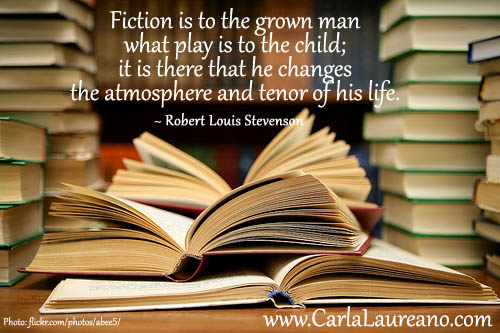Fictional Friday: Does Fiction Matter?

Does fiction matter? It’s been a question that’s made its rounds of the web lately, on Facebook walls, on agents’ and editors’ blog posts. And for good reason. The business of Christian publishing has been shaken up in the last several years. Just recently, two more announcements—the closing of B&H’s fiction line and the NavPress/Tyndale alliance—have thrown the CBA writing world even further in disarray. Most editors who work at publishers whose revenue comes mostly from non-fiction will tell you that the fiction line is under constant scrutiny. They’re called upon to justify their lines’ existence on a regular basis.
But fiction does matter.
Just take a look at this list of classic banned books. I’ll wait. Alright. Back? Did you notice anything interesting about the list? Besides the fact that these include some of the most celebrated literary works in the English language, every single one of them is fiction. If fiction didn’t mean anything, why bother? If it were simply a waste of time that didn’t touch anyone in some deep and meaningful way, where’s the harm?
Here’s the thing that the book banners understood and we have forgotten. Fiction is important. Fiction is also dangerous–in the best meaning of the word. It’s one thing to be handed an idea. It’s another to understand, to really internalize that idea in a real and personal way. In the process of reading fiction, we see our world through someone else’s eyes, mind, and soul. Sometimes we find confirmation for our deepest held beliefs. Other times, stepping outside ourselves challenges the things of which we thought we were most certain. It’s part of the reason why many Christian groups have decried fiction as being unbiblical, going as far to say that Christian fiction itself is a misnomer.
But here’s what I took away from my college education (and it just so happens to be my alma mater’s affirmation statement): Truth has nothing to fear from investigation.
What if reading a work of fiction causes us to question what we believed was true? If truth is actually Truth, then as Christians, we have faith that it will be proven out. Fiction should challenge us to understand our world, ourselves, and our faith in a new way. Even if we’re not reading what many of us would call “meaningful” literature, isn’t there value in a glimpse into someone else’s life, whether it’s our elderly neighbor, the drug addict on the corner, or the single mom? Should that experience not change us in some way, no matter how small?
What we take away from reading fiction says less about the author than it does about us as individuals. This quote by Robert Louis Stevenson sums up why fiction is important and why it must continue to hold an prominent spot in our publishers’ catalogs:
Fiction is to the grown man what play is to the child; it is there that he changes the atmosphere and tenor of his life.
Tags: banned books, burned books, Christian fiction, fiction, Robert Louis Stevenson

Add Your Thoughts